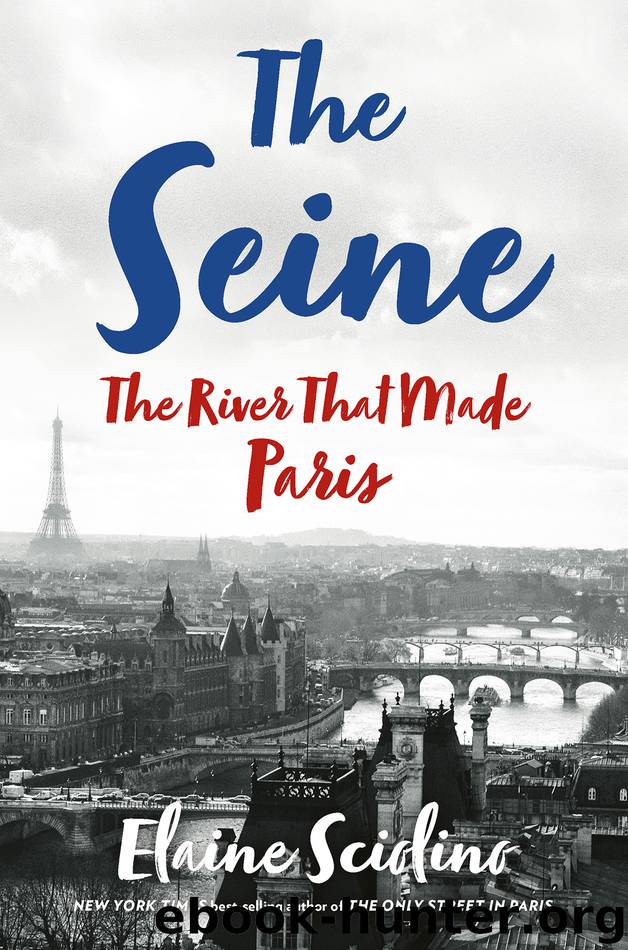The Seine by Elaine Sciolino

Author:Elaine Sciolino
Language: eng
Format: epub
Publisher: W. W. Norton & Company
Published: 2019-09-16T16:00:00+00:00
THE BOUQUINISTES are the literary gatekeepers of Paris. They have survived four centuries of censorship, economic crises, and political unrest. They endure wind, heat, frost, noise, floods, and air pollution and tolerate idle tourists and stingy customers. They claim that their bookstalls along the quays of the Seine make up the biggest open-air bookstore in the world.
In the eighteenth century, Thomas Jefferson, an obsessive collector of artworks, furnishings, and books, searched through the bouquinistes’ boxes for books on the United States, science, and architecture; he favored the Quai des Grands-Augustins, where Jacky now has his stall. Balzac called the bookstalls “catacombs of glory [that] have devoured many hours that belonged to the poets, to the philosophers, and to the men of science of Paris!” In his 1862 history of the Pont Neuf, Édouard Fournier wrote that this “famous bridge . . . was also a huge reading room.” In the twentieth century, the American-born writer Julien Green gazed into the zinc-lined wooden cases and found “many windows through which to escape”; the novelist François Mauriac saw “a door for entering an enchanting world.” Léon-Paul Fargue, the poet and essayist, celebrated the bouquinistes as Parisian heroes, calling them “the most delightful beings who contributed with elegance and discretion to the renown of intelligence that glorified Paris.”
Before and during his presidency, François Mitterrand enjoyed strolling along the quays in search of literary treasures in the bouquinistes’ stalls. Mitterrand wrote about his visits to the bouquinistes in letters to Anne Pingeot, the other woman in his life and with whom he had a daughter. In one letter, he described the joy of finding a rare, “deliciously rebound” book by the nineteenth-century poet and writer Gérard de Nerval; in another, he proposed a leisurely stroll, writing, “If the sun smiles on us while we walk, we will go to visit some good bouquinistes.”
In my early days in Paris, alone in a strange city, I spent long stretches of time strolling among the bouquinistes. I did not need to speak; the booksellers didn’t have to know that I lacked the imperfect subjunctive in French. I lost myself in old books, prints, newspapers, and magazines.
One day I got up the nerve to begin a conversation in French with a bouquiniste. His wooden boxes overflowed with hundreds of exquisite leather-bound books with gold lettering, elaborate cover designs and engravings, and satin ribbon page markers. “Do you have a reprint of Louis-Sébastien Mercier’s Tableau de Paris?” I asked in French.
“Mademoiselle,” he replied, “why would you want a reprint when you can have the original?”
The twelve volumes had been published in the 1780s. Where would I find an original?
He pulled out a business card and wrote the name and address of a book dealer on the back of it, instructing me to mention his name and ask the dealer the same question.
I headed over that same day. The bookstore was in Saint-Germaindes-Prés, on the Left Bank. It was one of those places that looked too important for amateurs. A man in his sixties greeted me with a gaze that was neither warm nor cold.
Download
This site does not store any files on its server. We only index and link to content provided by other sites. Please contact the content providers to delete copyright contents if any and email us, we'll remove relevant links or contents immediately.
Man-made Catastrophes and Risk Information Concealment by Dmitry Chernov & Didier Sornette(4738)
The Revenge of Geography: What the Map Tells Us About Coming Conflicts and the Battle Against Fate by Kaplan Robert D(3598)
Zero Waste Home by Bea Johnson(3292)
COSMOS by Carl Sagan(2950)
In a Sunburned Country by Bill Bryson(2948)
Good by S. Walden(2915)
The Fate of Rome: Climate, Disease, and the End of an Empire (The Princeton History of the Ancient World) by Kyle Harper(2436)
Camino Island by John Grisham(2385)
A Wilder Time by William E. Glassley(2364)
Organic Mushroom Farming and Mycoremediation by Tradd Cotter(2307)
Human Dynamics Research in Smart and Connected Communities by Shih-Lung Shaw & Daniel Sui(2179)
The Ogre by Doug Scott(2115)
Energy Myths and Realities by Vaclav Smil(2061)
The Traveler's Gift by Andy Andrews(2012)
Inside the Middle East by Avi Melamed(1940)
Birds of New Guinea by Pratt Thane K.; Beehler Bruce M.; Anderton John C(1907)
Ultimate Navigation Manual by Lyle Brotherton(1768)
A History of Warfare by John Keegan(1715)
And the Band Played On by Randy Shilts(1615)
